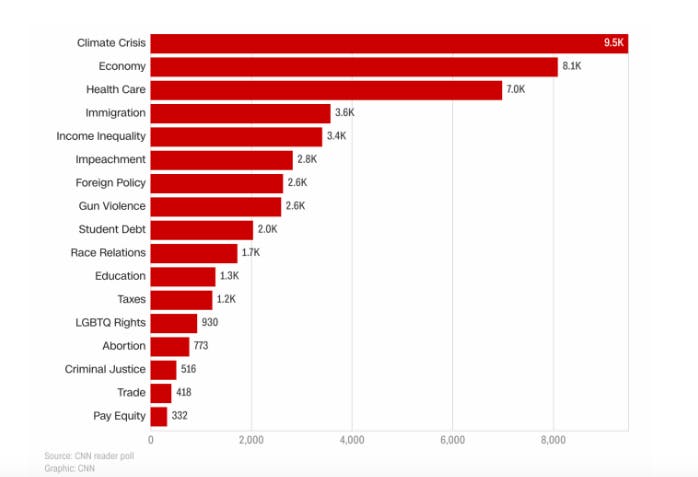In many respects, the second round of Democratic presidential debates represented a step forward in the fight against climate change. The issue was not directly mentioned at all during the 2012 and 2016 debates, but the CNN journalists who moderated Tuesday and Wednesday night’s events devoted a combined 20 minutes to questions and answers about the climate crisis—more that any news outlet ever has during a presidential debate.
The candidates raised the bar, too—both in their prioritization of the climate emergency, and in their professed understanding of its complexities. Five of the 20 presidential hopefuls mentioned the issue in their opening statements; Washington Governor Jay Inslee became the first candidate to devote an entire opening statement to it. Vermont Senator Bernie Sanders uttered the phrase “just transition” on a debate stage for the first time, referring to the framework for protecting workers’ livelihoods while phasing out fossil fuels. And nearly every candidate agreed that, in order to prevent catastrophe, the entire fossil fuel industry must be eliminated—even noted centrist, former Vice President Joe Biden.
The climate milestones in this week’s debates didn’t happen by chance. They come after years of effort by climate activists, scientists, and journalists to push Democrats and cable news outlets to stop ignoring the most existential threat of our time, and to treat it with the urgency and seriousness it deserves. But the fact that it took this long to reach these milestones illustrates how low the bar was in the first place—and how embarrassingly low it continues to be, given how dire scientists say the situation is getting and how large the public’s appetite is for a substantive climate policy debate.
Funny that the #DemDebate2 spent 11 minutes on the climate crisis when it’s an existential threat we have 11 years to solve 🤪
— Sunrise Movement 🌅 (@sunrisemvmt) August 1, 2019
Every issue-specific reporter wants their particular issue to be covered more prominently during a presidential debate. But in the case of climate change, prioritization is journalistically warranted. The job of a debate moderator is to balance what the public wants to hear from the candidates, and what it needs to hear. Climate change, at this point, is at the top of both lists.
CNN’s own polling shows as much. In a nationwide survey in April, aggressive action on climate change was the top issue among registered Democrats and Democratic-leaning independents. Last week, the outlet asked 50,000 viewers what they’d most like to hear about at the debates—and 9,500 people said climate change. The economy came in second with 8,100 votes, and health care came in third, with 7,000.

Determining what people need to hear about is more subjective, but there is no bigger or more intractable problem facing humanity than global warming. And considering the extremely limited amount of time scientists say we have to take effective action, the next president will have an outsize impact on whether or not those threats materialize. Of course, there are other critical issues facing millions of Americans—health care, for example. But as climate change worsens heat deaths, mosquito-borne diseases, and air pollution, it will place a huge burden on the health-care system.
It shouldn’t be a stretch, then, to say that climate change deserves at least proportionate attention to health care. But that issue got a combined 90 minutes of speaking time in Tuesday and Wednesday night’s debates, compared to 20 for the climate. Health care was also the first debate topic on both nights. It took 83 minutes before the first climate question was asked on Tuesday, and 97 minutes on Wednesday.
The Democratic candidates themselves were a bright spot. In the limited time they were given, many showed a promising understanding of the climate threat. Senator Elizabeth Warren only had one minute to explain her $2 trillion plan to create 1.2 million green manufacturing jobs, and managed to make it sound both realistic and exciting. Inslee conveyed the dire threat: “Literally the survival of humanity on this planet and civilization as we know it is in the hands of the next president. And we have to have a leader who will do what is necessary to save us. And that includes making this the top priority of the next presidency.” After Senator Kirsten Gillibrand said she would immediately rejoin the Paris climate agreement upon winning the presidency, Cory Booker roasted her for not being ambitious enough. “Nobody should get applause for rejoining the Paris climate accord,” he said. “That is kindergarten.”
But overall, that’s exactly what the CNN debates were: kindergarten. The moderators gave climate change the seriousness it warranted 20 years ago, not the seriousness it demands now. We have eleven years to start rapidly decarbonizing the economy. Time to graduate.
